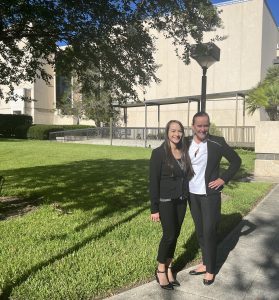During the pandemic, the justice system had to figure out alternative ways to perform legal services such as general meetings, arbitrations, mediations, and trials to honor the legal, due process for dispute resolution. Many professionals thought this would be a temporary solution, but now it seems that some of the new virtual components of our legal system are here to stay.
In Florida, it is estimated that at the height of the pandemic, between March and December 2020, more than 400,000 Zoom hearings and other events were held by courts for nearly 2.6 million people. These virtual trials, born out of necessity, are now seemingly a strong practical application in the legal process with enduring value. As with every new system, there are benefits and challenges on the path to full adoption.
“The legal system needs to lean into the benefits technology provides to all our constituents. Remote testimonials have been a part of the legal process for years, but with Zoom, we have the opportunity to see the faces of the people that we are in contact with, bringing a personal connection to the virtual world,” said Diana M. Tennis, Judge of the 9th Judicial Court of Florida. “It al so provides more equitable services and increased access to professional services, removing some barriers to participation such as cost of transportation and childcare that many people face and the reason for extended penalties and recidivism.”
so provides more equitable services and increased access to professional services, removing some barriers to participation such as cost of transportation and childcare that many people face and the reason for extended penalties and recidivism.”
In addition to the expanded accessibility of virtual trials and mediation, the virtual space has also allowed attorneys and judges to conduct hearings remotely, which has helped decrease delays and reduce legal bills that are paid based on an hourly engagement. Simple calendar or motion hearings are two examples of a virtual hearing resulting in a cost and time-effective solution to a fundamental legal process.
“Mediation has been a core element of legal dispute resolution, and virtual mediation has been a positive evolution for the process,” Donald A. Myers, Jr, Former Judge of the 9th Judicial Court of Florida. “Participation is key to successful mediation, and there are some instances when the virtual environment gives you the ability to mute or assign a participant to a breakout room, which is not possible in an in-person environment, giving the mediator more control of the tone and pace of the meeting for a more successful negotiation for all parties involved.”
On the client side, minimizing the legal costs and time spent attending these shorter court appearances is a positive change. Still, it is challenging to overlook the fact that these are prime training grounds for young attorneys and interns who are just starting their careers. Historically, just like every entry-level job, these hearings are the place to practice their presentation skills, build confidence while speaking to an audience, and gain insight into arbitration, mediation, or calendar hearing flow. It is also where feedback on effective or non-effective legal arguments is immediately apparent. This early training and the learning from each turn in the courtroom could impact the future success of the next generation of attorneys.
The entire scope of legal virtual work is still developing, and as a legal community, there are strong arguments on both sides. A Spring 2021 Rulo Strategies study, in collaboration with the National Center for State Courts (NCSC) and Wayne State University, revealed that 46.8 percent of court staff respondents reported strong support for continuing virtual hearings, with many preferring a hybrid approach. The survey shows that overall, 45 percent of respondents reported they would prefer to attend court, 100 percent virtually; 29 percent reported they would prefer a hybrid of in-person and remote court hearings. Twenty percent said they’d prefer in-person sessions only.
The jury is still out on virtual hearings but in my 20 plus years of practicing family law, a growth mindset has been one of the keys attributes to my longevity and my love of this profession. Law is a very complex institution, and as legal professionals, we understand that the research mechanisms, precedence, perceptions, and people are constantly changing. I think the answer for virtual legal hearings lies in a fluid hybrid system that is a mix of in-person and virtual hearings depending on the depth and breadth of the case. For example, 15-minute appearances for misdemeanor traffic volitions could be conducted virtually, leaving in-person resources for proceedings requiring a jury trial such as felony cases or final judgments. As with every process, it will take time to create an equitable virtual legal process, even if it is from only a few mouse clicks away.
Rebecca L. Palmer, Esq. is a Family & Marital Law attorney practicing in Orlando, FL. She is the Managing Partner of the Rebecca L. Palmer Law Group, and she can be reached at rebecca@rlpvlawgroup.com.



